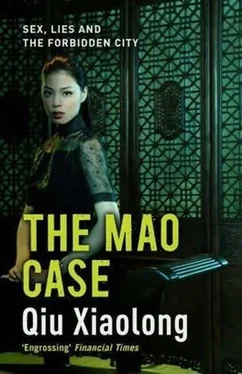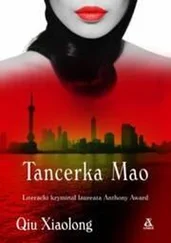“So I am to approach Jiao as anything but a cop -”
“It’s in the interest of the Party.”
“Comrade Zhao said that to me in another case,” Chen said, realizing that it was pointless for him to argue. “But there’s still no guarantee that Shang left anything behind.”
“You don’t have to worry about that. You go ahead in whatever manner you choose, and we trust you. I’ve already talked to your Party Secretary Li. He’s going to retire soon, you know. When this job is accomplished, you’ll advance to a position of greater responsibility.”
It was an unmistakable hint, but was Chen looking forward to such a position of greater responsibility? Still, he knew he had no choice.
Minister Huang said farewell and hung up. Chen closed the phone. When he moved back into the eatery, the noodles on the table were quite cold, the house special, greasy and gray on the surface of the urn, and the beer, stale and bubbleless. He had no appetite left.
Auntie Yao hurried over, offering to warm up the noodles, which, having soaked so long in the soup, would taste like paste anyway.
“No, thank you,” he said, shaking his head as he took out his wallet. Gang came limping over to Chen again.
“Now I recognize you,” Gang said. “You used to live in the neighborhood, calling me Uncle Gang. Don’t you remember that?”
“You are…?” Chen said, unwilling to admit he had long recognized him.
“A successful man may not have a good memory,” Gang said with a fleeting gleam in his eyes. “I’ll take care of the leftovers for you.”
“I’ve not touched anything – except the fish head,” Chen said.
“I trust you,” Gang patted on his shoulder. “Now you’re somebody.” The smoked carp head stared at the two of them with its ghastly eyes.
WHEN CHEN GOT BACK to his apartment, it was past eight.
The room was a scene of desolation, as if corresponding to his state of mind: the bed unmade, the cup on the nightstand half empty, a mildew-covered orange pit in the ashtray looking like a mole – the mole on Mao’s chin.
He pressed hard on the lid of the thermos bottle. Not a single drop of water came out. Putting the kettle on the stove, he hoped that a cup of good tea might help to clear his head.
But what first came to mind was, unexpectedly, a fragmented image of Ling serving tea in a Beijing quadrangle house, her fingers breaking and strewing petals into his teacup, standing by the paper window in a white summer dress, silhouetted against the night like a flowering pear tree…
The news of her marriage wasn’t entirely unexpected. She wasn’t to blame, he told himself again; she couldn’t help being the daughter of a Politburo member.
No more than he could help being a cop at heart.
He willed himself to focus on the waiting work, pressing a fist against his left cheek, as if battling a toothache. He didn’t want to conduct an investigation concerning Mao, even indirectly. Mao’s portrait still hung high on the gate of Tiananmen Square, and it could be a political suicide for a Party member cop to be even tangentially associated with the skeleton of Mao’s private life.
Chen took out a piece of paper and was trying to scribble something down to help him think, when Party Secretary Li called.
“Minister Huang told me about your special assignment. Don’t worry about your work at the bureau,” Li said. “And you don’t have to tell me anything about it.”
“I don’t know what to say, Party Secretary Li.” The water began boiling and the kettle hissing. Li, at one time a mentor for Chen in bureau politics, had come to regard him as a rival. “I hardly know anything about it, not yet. It’s just that I cannot refuse the assignment.”
“The minister told me that you are to have access to all the available resources of the bureau. So simply tell me what you need.”
“Well, first, don’t tell anyone about the assignment. Instead, say I’m taking a leave for personal reasons.” He added, “Detective Yu should take over the work of the Special Case Squad.”
“I’ll announce his temporary appointment tomorrow. I know that you trust Detective Yu. Are you going to tell him anything?”
“No, not about the assignment.”
“I’ll take care of everything at the bureau. Call me whenever you need anything.”
“I will, Party Secretary Li.”
Putting down the phone, Chen paced about the room for a minute or two before he went over to the boiling kettle, only to discover that the tea box was empty. Rummaging through the drawer, he failed to find any tea. No coffee either, which didn’t matter, as the coffee maker had been broken for weeks.
He leaned back, stroking his chin. He had cut himself shaving this morning. It had been a rotten day from the beginning.
Suddenly there was a knock at the door. To his surprise, it turned out to be a special delivery package containing the Jiao files from Internal Security. He wasn’t expecting to get it so quickly.
He sat down at the table with a cup of hot water, and an impressive file spread over several manila folders. Internal Security had done a comprehensive job. The file contained not only information about Jiao, but about Qian and Shang as well, covering all three generations.
Chen decided to start with Shang. He lit a cigarette and took a sip of water. The water quality was terrible, and it tasted strange without tea leaves.
Shang had come from a “good family” in the thirties. While still in college, she was named the college “queen,” nicknamed a “phoenix,” before being discovered by a movie director. Soon she came to prominence as a young, graceful actress. After 1949, because of her family background and her husband’s political trouble, her career suffered. It was said that her career’s decline also had something to do with her pre-1949 image. She was known mostly for playing upper-class ladies, elegant in their magnificent houses and stylish dresses, and those roles had practically disappeared from the movie screens of socialist China. Mao had declared that literature and art should serve workers, farmers, and soldiers through representation of them on stages and screens. Suddenly, however, her photos began to reappear in the newspapers, in articles that said Chairman Mao was encouraging Shang and her colleagues to make new, revolutionary films. She then starred in several movies, playing workers or farmers, and she won major awards for the roles. Her resurgent career was cut short by the outbreak of the Cultural Revolution. Like other well-known artists, she was subjected to mass criticism and persecution. What’s more, a special team was sent by the Cultural Revolution Group of the Central Committee of the Communist Party to interrogate her. Shortly afterward, Shang committed suicide, leaving her daughter Qian alone.
A sad story, but not uncommon in those years, Chen reflected, rising and rummaging through the drawer again. This time he uncovered a tiny ginseng tea bag. How long it had been lying there, he had no idea. He tossed it into the cup, hoping it could somehow boost up his energy. He had practically skipped his dinner, thanks to the phone call from Beijing.
Sipping at the ginseng tea, he settled back down to the file and began reading the part about the second generation, Qian, the heroine of the best seller Cloud and Rain in Shanghai.
An orphan after Shang’s death, Qian had a hard time adjusting to her drastically changed life. Shang’s problem shadowed her – Qian was forcibly exposed to what the file referred to as Shang’s “shameless sex saga” – and the daughter grew up to be a “shameless slut.” In those years, a girl of black – politically questionable – family background was supposed to behave with extra care, but Qian abandoned herself to youthful passion. She fell in love with a young man named Tan, also of black family background. Despairing of their future in China, they made a desperate attempt to sneak into Hong Kong. They were caught and marched back to Shanghai, where Tan committed suicide. Qian survived because she was pregnant. She gave birth to a daughter, but soon after fell for a boy named Peng, about ten years younger than she, who was said to look like Tan. Peng was thrown into jail for sexual perversity. Not long afterward, toward the end of the Cultural Revolution, she died in an accident.
Читать дальше












